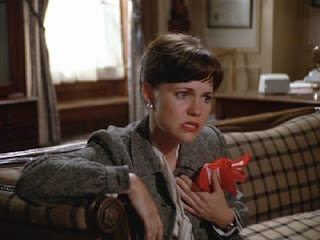Three words to describe this movie-
Short but impactful. This movie may not have computer-generated imagery, nor
not many casts as well (Yes, I did count the number of cast for this movie when
the credits rolled up, about only 14-15 only), but the story was depicted
perfectly on how a father, Stanley Philips played by John Cusack, struggles to
find courage to tell his two daughters Heidi and Dawn about their mother’s
death during her serving the country she loved. Throughout the movie, the
essence of him bringing his kids to Enchanted Gardens was to find meaning in
this life, and coupled with his ways of grieving the loss his loved one.
Unexpected deaths are never easy. I
can say this because I have been there. Throughout my life, I have never lost
anyone dear to me, until the year 2013, when my grandmother was sent back to
the heavens. It was so abrupt, so sudden that I did not get a chance to say my
last goodbye, and it hurts until to this very moment. Stanley also has this
sudden blow to the face when two soldiers came with the message that all
families that have members serving their country dread about. Once he got this
news, he began his first stage of grief, which is Denial. Denial happens when we block out the situation, and hide
the facts. This can be seen when Stanley was reluctant to tell the two
daughters about the mother’s death. Additionally, it was also depicted when he
calls the house to update his wife on their whereabouts, however, as we watched
the movie more, we soon found out that, he wanted to hear her voice, still, he
was in denial. He couldn’t fathom that he will never see his wife, ever again.
After deciding that he will not
tell his daughters yet about the death, he spontaneously went on a road trip to
the Enchanted Gardens, where they all went once together as a family. En route
to Enchanted Gardens, apart from the grieving process of Stanley, we could see
how he tries to find meaning of his
existence. Few examples was when he did the spontaneous trip, sure it was out
of denial, but it could be the fact that, he wanted to make sense of his life
after her death. Next would be an interesting scene, when he let loose of himself,
the scene when he did ‘doughnuts’ in the field, and when Heidi asked him why he
was doing to which he replied by saying “I
do this all the time when I was a teenager”, and “I did not put a ton of
thought into everything he did when he was a kid”. I believe it is implied
that, after his wife’s death, he knew that death is unexpected, and that it is
time for him to live life to the fullest.
On the way to Enchanted Gardens, he
stopped by his mother’s house, only find out that she is not in, but his
brother, John was. John later goes for dinner with Heidi and Dawn, but Stanley
did not tag along, he isolated himself, and was in a short moment of
depression, this stage is called Depression.
His brother soon knew what happened, and when he was trying to convey his
opinion to his brother, Stanley lashed at him. This would be Anger in the stages of grief. This
anger can be projected to anyone or anything. Though he pinned his brother to
the door, John knew that this anger was not on him, but the result of Grace’s
death, to which later they both embraced.
Before continuing their trip,
Stanley made one last stop at the gas station to make a phone call to hear his
wife’s voice again, he then depicted the Bargaining
stage of grief, where he mentioned that when they came to Florida before she
was shipped out, he wanted to apologize that he was angry, and the reason he
was angry was because he was ashamed that she was going and not him, and that
the girls would be better off if she did not go. This scene implied that he
felt guilty of how he behaved when she was alive. Guilt is often bargaining’s
companion, Stanley was trying to negotiate his way out of the hurt he was
experiencing.
After hours of driving, they
finally reached Enchanted Gardens, and even though they were enjoying
themselves, the audience knew that, their joy will be short lived, as it was already
made clear that the father would soon reveal what has happened. As they were
heading back home, you can see that Stanley was hesitant on telling, but he
took the courage, stopped by the beach, and finally said it. I think, Stanley
needed to accept the fact that Grace is gone, and realize life should go on. I believe
this last scene is the last stage of grief, which is Acceptance.
To conclude, I liked how the movie
ended with all three of them waiting for “the time of the day” at her tombstone so that they think about each
other at the same moment, it shows that even though she’s not here in this
world anymore, that does not mean they should stop loving her. I will end with
this quote:
“If the people we love are stolen from us, the
way to have them live on is to never stop loving them.” —James O’Barr.
Reference:
Kübler-Ross, E., & Kessler, D. (2014). On
grief and grieving: Finding the meaning of grief through the five stages of loss. Simon and Schuster.















